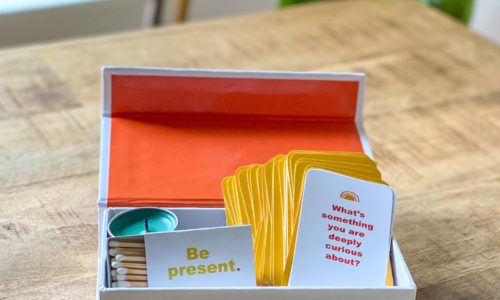When Jeff and I started Acton Academy, we spent a lot of time pondering how we could prove learning beyond simply giving a test.
We thought about our own children. How did we know when they had learned to walk? They walked! How did we know they could add and subtract in their heads? We’d play the card game “21” with them. For writing? We could see a comparison of the notes and stories they had written to us over time.
This was the kind of proof we wanted at Acton Academy —applying learning to real-world situations and problems to show what the children could do not just how they could take a test. We knew we’d have portfolios of work and online dashboards to give detailed data documenting progress but what were we missing?
We visited High Tech High in San Diego and experienced their impressive public exhibitions of students’ projects. We also had seen how the Children’s Business Fair played out as the perfect prototype of assessment. Did you make a profit? Could you do the math in your head to give correct change? Were your customers satisfied? Did you create signs and advertisements that were legible and persuasive? What will you do differently next year?
With these ideas in mind, we designed Acton’s Exhibitions of Learning to take place at the end of each session (every five to six weeks) as real-world tests for the Eagles to prove what they had accomplished. These events would be designed and executed by the Eagles themselves with parents and guests invited to attend.
Examples of Exhibitions we’ve held in the past:
- A play written about the Hero’s Journey, marketed, produced, and performed by the children. The test? These young Eagles, ages six to ten years old, passed out a survey at the end and asked the audience members to share whether or not the play inspired them to find their own calling. They also sat on the edge of the stage after their performance to answer questions about the process and their learning.
- A writers’ café with children arranging the room, creating a printed program, welcoming guests, serving lemonade, and then reading their poetry aloud to a community audience. The test? The Eagles had to pitch their piece to a group of peers. Their peers then voted. The winners read out loud. All the poems were included in a printed anthology distributed broadly.
- An art exhibit. The test? A completed, matted, and framed self-portrait. Eagles stood by their works and explained the process of creating their self-portraits and what they had learned.
- A physics competition of simple machines, with the winning team getting its design built into a life-size playground addition. The test? The teams had to pitch their machines to parents, who then voted on which was best designed to be added to the campus playground.
In addition to showing what they’ve learned, these exhibitions are designed to serve as incentives for the Eagles over the course of a session. Nothing like a deadline and an audience to get people cranking on their work.
But there is a caveat I give parents about these exhibitions: be prepared to see failure and struggle. These are not pristine, tightly managed school performances. Our exhibitions are meant to display the grueling process of learning rather than a polished end product. In addition to letting the Eagles shine, they also let them experience the real-world consequence of not giving one’s best to a project if that’s the case. (The latter may be the most important learning of all.)
While these events give a sense of finality to a particular quest, project or challenge, exhibitions are more like weigh stations than final destinations. Unlike a final test which you are free to forget what was learned when it’s over, the learning from one exhibition extends into the next session.
Even more important in terms of deepening the learning is what happens in the days after the exhibition. The Eagles gather together as a tribe in their studios to reflect and share what worked, what didn’t, how they will change their work strategy to improve and what they are looking forward to learning in the new session.
Exhibitions are a great reminder that, at Acton, the journey goes on forever and the learning never ends.
(Thanks to Robert Earl Keen for the word choice inspiration.)


